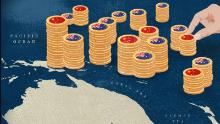

The opening of a Chinese embassy on Kiribati, a nation of 33 atolls and reef islands in the central Pacific, might have seemed strange -- particularly during a pandemic. Just three other countries have embassies in the island state: Australia, New Zealand and Cuba.
Yet Kiribati is the site of growing geopolitical competition.
Last September, it switched diplomatic recognition from Taipei to Beijing. China considers the self-governed island of Taiwan a breakaway province and has poached seven of its diplomatic allies since 2016.
And this week, Kiribati's pro-Beijing President Taneti Maamau -- who oversaw the country's diplomatic switch -- won a closely watched election after campaigning for closer ties with China, defeating an opposition rival who was sympathetic to Taiwan.
Now, as Canberra and Beijing pour aid into the region, the possibility of a travel bubble between the Pacific Islands and Australia has given the rivalry a new dimension.
Deepening reach
For the Pacific Islands, which have a combined GDP of about $33.77 billion -- less than 1% of China's total GDP -- China has been a crucial partner during the pandemic.
The islands have so far largely warded off the coronavirus thanks to their remoteness and early lockdown measures. But local communities could face devastating consequences if the virus was to be hit, because of inadequate health care and lack of testing capacity, experts have warned.
"China's engagement in the Pacific today has been one driven by opportunism, they're trying to gain as much influence as they can," said Jonathan Pryke, director of the Pacific island program at the Lowy Institute.
But stronger ties can come in handy in times of need.
In May, when China was facing a global backlash over its early handling of the coronavirus outbreak, it turned to the Pacific for support. Days before the World Health Assembly meeting in May, ministers from 10 Pacific Island nations joined a video conference on Covid-19 convened by China.
The meeting ended with a glowing affirmation of China's coronavirus response.
"This is what the Chinese government needed," said Denghua Zhang, from the Australian National University in Canberra.
The Trump administration has repeatedly blamed China for the pandemic, while Canberra has infuriated Beijing with its call for an independent inquiry into the origins of the virus.
Australia steps in
"The Australian government has clearly acknowledged that there can't be any room for vacuum creation, (be it) the hard power, soft power, the aid front, or the medical front," Pryke said.
"They can't step back from any vacuum for fear that China might fill it."
Travel bubble
One way the pandemic could affect the geopolitical rivalries in the Pacific is the selective easing of travel restrictions among countries.
As Australia and New Zealand bring the coronavirus under control, their politicians are talking about opening up borders between each other, creating a travel corridor -- or "travel bubble" -- between the two nations.
Both countries had successfully flattened their coronavirus curves by late April, though Australia is now facing a spike in cases in the state of Victoria.
So far, there has been no publicly reported plan between the Pacific Islands and China for a similar travel bubble. At the moment, China seems to be focusing on its neighboring borders -- its southern province of Guangdong has been in discussion with Hong Kong and Macau for a travel bubble.
Some Australian politicians are also eager to see a trans-Pacific bubble.
Dave Sharma, an MP for the governing Liberal party, wrote in The Australian newspaper last month that the inclusion would help Canberra's Pacific neighbors economically, and ensure that "they continue to see Australia as their partner of first choice."
"Strategic competition in the Pacific is alive and well, with China and other countries seeking to play a greater role. It is important our influence and footprint in our near neighborhood is visible," he wrote.
While geopolitics is not the primary motivator for a travel bubble -- rather, the key driver is the urge to get economies back on track, Pryke said -- the lifting of travel restrictions between Australia and the Pacific Islands would secure some geopolitical gains for Canberra and Wellington.
"In a way, Australia and New Zealand would become gatekeepers for access into the Pacific whilst the pandemic is continuing around the world. So that would of course give Australia and New Zealand further geopolitical advantages," he said.









 Add Category
Add Category